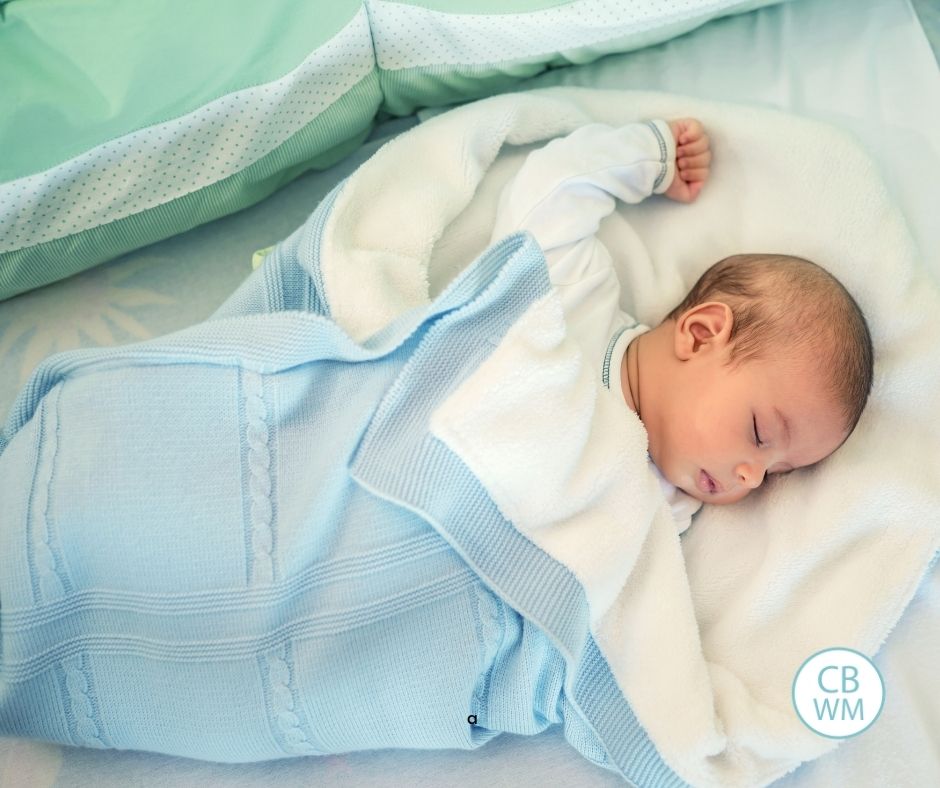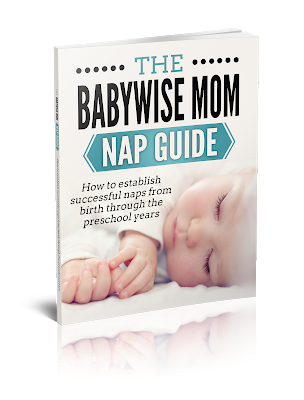by Rachel Rowell from My Baby Sleep Guide
This list will work for any age child, but it is especially made for younger children and newborns. I hope it helps!

Post Contents
- Avoid overtiredness
- Swaddle your baby
- Help baby distinguish night from day
- Avoid overstimulation
- Avoid Sleep Props
- Try to put your child to sleep drowsy but awake
- Follow a Routine/Schedule
- Establish Solid Sleep
- Thank you!
- Start a Pre-Sleep Routine
- Be consistent
- Create a good sleep environment
- Stick to an early bedtime
- Consider tanking up with cluster feeding and the dreamfeed
- Feel comfortable with whatever you are doing
- Watch your baby’s cues closely and expect change
- Realize that many newborns do not sleep well in the evening during their “witching hour“
- Learn about developmental periods that make sleep training or sleep in general tough
- Relax! Don’t obsess! Relax!
Avoid overtiredness
I can’t mention this enough. Pay attention to your baby’s waketime, pay attention to your baby’s sleep cues and consider keeping a sleep log. Keep in mind that newborns are often up only to eat and have their diaper changed and then it is time to go back to sleep. If you keep a newborn up too long, helping her go to sleep is going to be really hard–for the both of you! Find that optimal waketime and try hard to keep with it. And keep in mind that it changes and you need to change with it or you’ll have a whole new set of problems!
Swaddle your baby
A newborn that is swaddled is more likely to sleep for longer stretches of time–for naps and during the night. She will also probably settle more easily to sleep. Now who wouldn’t want that? I really like specially made swaddle blankets. I have found that they keep most babies swaddled better and they also make sure baby is swaddled the correct way (see hip dysplasia and swaddling). There are some great ones out there that even help keep those houdinies swaddled!
Help baby distinguish night from day
Some people go all out on trying to help baby distinguish night from day. They keep things crazy loud and bright during the day– even during naps. I haven’t found it necessary to do this to such an extent. Simply keeping things light and somewhat active during baby’s waketimes during the day and quiet and dark at night is usually enough to let baby know the difference between these two times. And only change a diaper at night if you need to (they will end up sleeping in their own pee until they are potty trained so don’t worry about it–you can’t help it!). By need to I mean they won’t leak their diapers. Try night time diapers, a bigger size up diaper, cloth inserts or even a soaker cover to prevent night time leaks. In older children, don’t give them much to drink before bed.
And of course, the eat/wake/sleep cycle does wonders at helping baby distinguish day from night.
Avoid overstimulation
Newborns get overstimulated very easily. Even staring at your face can be pretty intense for them. I know they are cute, but try to contain yourself 🙂 If you (or grandma) overdue it, you very likely will have a baby that has a hard time settling down for sleep. Older children get overstimulated too, so try to turn off the tv and stop the roughhousing at least 30 minutes before bed (how long before depends upon your child).

Avoid Sleep Props
Sleep props, like consistently nursing or rocking to sleep, don’t always cause problems with sleep, but more likely than not they will. So try to “start as you mean to go on” as the Baby Whisperer says. Sometimes we have to do sleep props to survive or to ensure our child gets some sleep or to extend naps and that is OK. You do what works for you and your baby and your particular situation. Starting as you mean to go on is good, but sometimes it doesn’t work out out perfectly.
Try to put your child to sleep drowsy but awake
As your child gets older you will probably be putting her to sleep more and more awake. If she starts to resist you when you try to get her drowsy before sleep, it is probably time to put her to sleep more awake.
Follow a Routine/Schedule
Children thrive on routines and consistency as you all know. Keep a consistent morning wake time. Follow the pdf method and the eat/wake/sleep cycle. Encourage full feedings. Try to avoid sleeping during feeds. Be consistent, but flexible.
Start a Pre-Sleep Routine
Make the sleep routine soothing, consistent, predictable and something to look forward to. Avoid things, like the TV, that may be stimulating. Dim the lights. Read a book. Sing a special song. Give lots of snuggles. Enjoy your special time together 🙂
Be consistent
I have mentioned consistency more than once during this post but it is important enough that I want to mention it again. If you want good results, you need to be {mostly} consistent. Also give things long enough time to work before you decide what does and doesn’t work. It is fine to change things up, but don’t throw ten different things at your child at once without ever giving them a good try. You’ll send her for a tail spin and you’ll have no idea what caused what and what helped or hurt.

Create a good sleep environment
Keep the temperature around 65-70 degrees Farenheit. Make sure the room is dark at night and in the early morning hours. Try to have your child sleep is his actual bed if at all possible. Avoid itchy clothing and use footed sleepers and sleeper blankets instead of blankets for young children. You might want to consider using white noise if you have a really noisy house or if you child seems to benefit from this.
Stick to an early bedtime
This one thing alone fixes so many problems! Most children do best with a bedtime around 6-8 (depending on naps, morning wake time, age and total sleep required at night). Bedtime may be earlier than usual for a while if you are adjusting to a dropped nap or other changes. It may also be super early for a while if you are trying to combat a cycle of over tiredness. Also, many babies do a bit better with a slightly later bedtime during the newborn period. This usually naturally moves earlier as they get older.
Consider tanking up with cluster feeding and the dreamfeed
Tanking up helps to {hopefully} extend night sleep and the dream feed helps to put the longest stretch of sleep right when you go to bed. And when baby starts sleeping longer, the dreamfeed will be the one and only night feed, instead of one in the middle of the night. NICE.
Feel comfortable with whatever you are doing
Don’t do something unless you are comfortable doing it, especially when it comes to sleep training. If you do, you will feel crummy doing it and you will likely not stick with it. But remember, just because something is hard to do, it doesn’t mean it is the wrong thing to do.
Watch your baby’s cues closely and expect change
The one consistency with babies is their ability to keep changing! Change with them or sleep problems will pop up.
Trial and error is the only way to figure out if something actually works! You won’t know until you try it! Waiting until you know exactly what will work (which is impossible to know) will just lead to a lot of waiting!
Realize that many newborns do not sleep well in the evening during their “witching hour“
Instead of feeling frustrated about this, use this time to get out and do something with your baby (who won’t sleep at home anyway). Use the swing or a baby carrier. Do what works to get you through this time. My youngest spent most evenings in a wrap the first few months of his life. It kept him content during this fussy time and he even fell asleep sometimes.
>>>Read: How To Manage Baby’s Dreaded Witching Hour
Learn about developmental periods that make sleep training or sleep in general tough
One of these is the Wonder Weeks. During this time your child mental (and often accompanying physical changes) that cause him to see the world in a while new light–and sleep often suffers. If you know about this, you’ll have a heads up about what is going on and won’t be so flustered. There are also developmental periods mentioned in the book Bedtiming that may not work well for initiating sleep training.
Relax! Don’t obsess! Relax!
Enjoy your baby. There will be sleep regressions and hiccups along the way. Remember, all babies have their off days just like we do. Don’t worry about it.
Keep the end goal in mind when things are tough and you feel like giving up. Try working on one thing at a time. Find some support (like this site!). Have some {more} patience (remember, your baby is only X weeks old 🙂 Relax and don’t let that bad nap ruin your day!



